In the crypto market, many people have an inherent impression of Japan as being closed and independent. In many cases, its presence is not strong and it is easy for people to ignore it. Compared with other markets in Asia, Singapore, Hong Kong, and South Korea are more mentioned by people. and attention.
However, as the world's third largest economy and a country that established the status of cryptocurrency and developed a regulatory framework earlier, Japan has unique advantages and market characteristics. As governments embrace crypto and push the industry forward, new changes and opportunities are coming.
Macroeconomic indicators and current situation
Japan has a strong and complete financial system, which has laid a solid foundation for the development of blockchain and Web3 technology in the country. Regulation becomes a key focus in discussions about the Japanese cryptocurrency market.
The country maintains strict regulatory measures to safeguard investor stability, market security and overall integrity. While these regulatory measures are intended to protect the industry, they may pose a barrier to the entry and expansion of smaller cryptocurrency businesses due to compliance complexities and large tax burdens on cryptocurrency-related gains. Additionally, a lengthy token listing approval process may lead to the perception of lower market activity.
Geographical location and population size
Japan is an island nation in East Asia located in the northwest Pacific Ocean and is part of the Ring of Fire, spanning an archipelago of 14,125 islands, the five main islands of which are Hokkaido, Honshu ("mainland"), Shikoku, Kyushu, and Okinawa, and Nearly 4000 smaller islands. Japan is closest to Russia's Siberian region, while South Korea and China are farther south. Tokyo is the country's capital and largest city, followed by Yokohama, Osaka, Nagoya, Sapporo, Fukuoka, Kobe and Kyoto.
According to the United Nations, Japan has a population of nearly 125 million, of which nearly 122 million are Japanese nationals (estimated in 2022), accounting for 98.1% of the country’s population. The remainder are a small number of foreign residents, including indigenous Ainu, Ryukyus, and Koreans. , Chinese, Filipinos, Brazilians who are mostly of Japanese ancestry, and Peruvians who are mostly of Japanese ancestry.
Japan is the fastest-aging country in the world, with the highest proportion of older people of any country, accounting for one-third of its total population, and a consequent increase in life expectancy and a decline in birth rates. Japan's total fertility rate is 1.4, which is lower than the replacement rate of 2.1, and is among the lowest in the world; the median age is 48.4 years, the highest in the world. The Japanese government predicts that by 2060, there will be one elderly person for every working-age person. Immigration and fertility incentives are sometimes suggested as solutions to providing younger workers to support the country's aging population.
Economic structure and characteristics
Japan is the fourth largest economy in the world, after the United States, China and Germany (Germany will surpass Japan to become the third largest economy in 2023). Its economic composition is mainly based on the service industry, manufacturing and import and export businesses. Japan’s economic characteristics reflect its high degree of industrialization, strong dependence on foreign countries, and unique economic structure and business organization:
The services sector accounts for approximately 70% of Japan's GDP and is known for wholesale and retail trade, real estate services, and professional, scientific and technical activities;
It has a high degree of industrialization and is a leader in the global electronics and technology fields, with agriculture not playing a major role;
Mainly processing trade, importing raw materials and fuels, exporting products to open up international markets, it is the fifth largest exporter and the fourth largest importer in the world;
The businesses are mainly distributed in the narrow strip along the Pacific coast and the Seto Inland Sea, which is conducive to the import of raw materials and the export of products;
Manufacturers, suppliers and dealers are closely integrated to form a strong corporate alliance with close teamwork;
The career promotion system and lifetime employment system based on seniority are its obvious features, which also makes it difficult for foreign companies or new companies to enter the Japanese market;
In addition, changes in demographic structure have a significant impact on its economy. Japan is facing problems such as a decline in the proportion of the labor force, aging, and a declining birth rate. These factors have led to a decline in housing demand, suppressed capital accumulation, and a lower return on investment, thereby affecting economic activities and innovation. .
GDP ranking overtaken by Germany
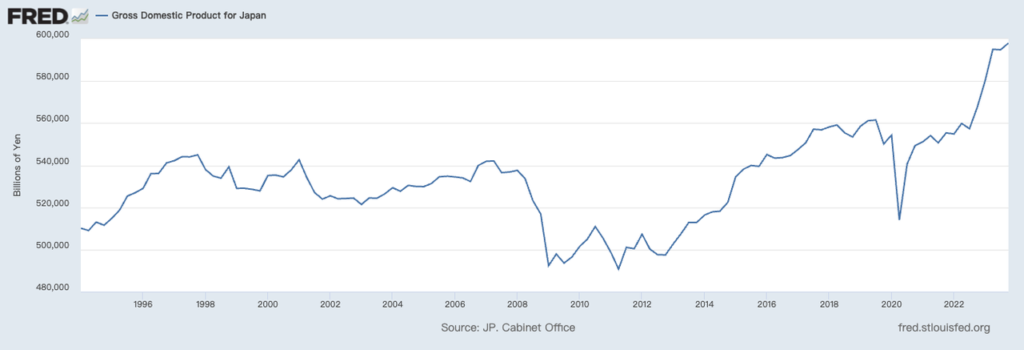
According to a report by Japan's Kyodo News Agency on February 15, Japan's nominal gross domestic product (GDP) in 2023 will be US$4.2106 trillion, lower than Germany's US$4.4561 trillion, falling to fourth place in the world. Japan's loss of its status as the "world's third largest economic power" is not accidental, but the inevitable result of its economy's long-term lack of stable growth momentum. In October 2023, the International Monetary Fund (IMF) predicted that Japan's nominal GDP would be overtaken by Germany in 2023. Therefore, when the results were officially released, it did not cause much public opinion waves or rebound. Japanese society seems to have accepted this result calmly.
The long-term lack of stable growth momentum in the Japanese economy is the underlying reason why Japan's nominal GDP will be surpassed by Germany in 2023. How to find long-term momentum to promote Japan's economic development may have become a top priority for the Japanese government. If the economy continues to be sluggish in the next three to five years, all of this will become a real problem for Japanese society.
Inflation rate data
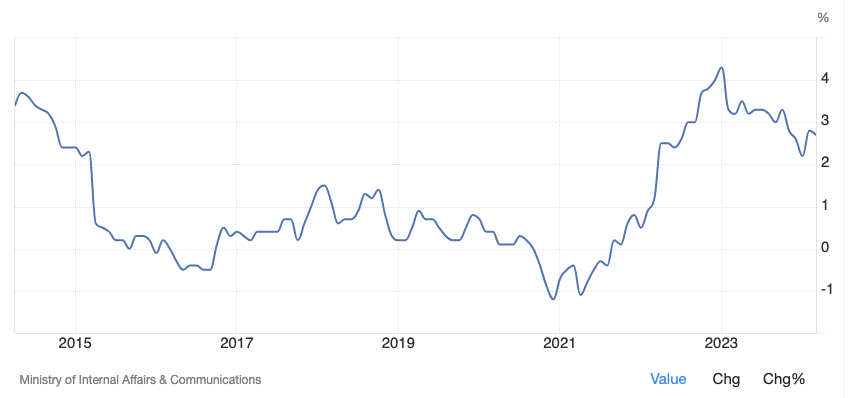
Japan's annual inflation rate fell to 2.7% in March 2024 from a 3-month high of 2.8% in February, in line with market expectations. Transportation (2.9% vs. 3.0% in February), Clothing (2.0% vs. 2.6%), Furniture and Household Products (3.2% vs. 5.1%), Healthcare (1.5% vs. 1.8%), Communications (0.2% vs. 1.4% ) and culture and entertainment (7.2% vs 7.3%) prices slowed. Meanwhile, inflation in food (4.8%), housing (0.6%), education (1.3%) and other (1.1%) remained stable. At the same time, prices for fuel and light sources fell the least over the past year (-1.7% vs -3.0%), with electricity (-1.0% vs -2.5%) and natural gas (-7.1% vs -9.4%) falling at a faster pace. slow,
The Bank of Japan ended its negative interest rate policy last month, moving away from a decade of ultra-easy monetary policy. Markets are looking for clues on when the Bank of Japan will raise interest rates again. The Bank of Japan said that a virtuous cycle of sustained and stable achievement of the 2% price target and strong wage growth is crucial for policy normalization.
At the same time, the Bank of Japan is focusing on whether service prices will rise along with wage growth. This year, Japanese corporate wages have increased the most in 33 years. However, real wages after adjusting for inflation have continued to decline in the past two years. A Japanese Interior Ministry official noted on Friday that the impact of recent wage increases has not yet been reflected in service prices.
Japanese legal tender
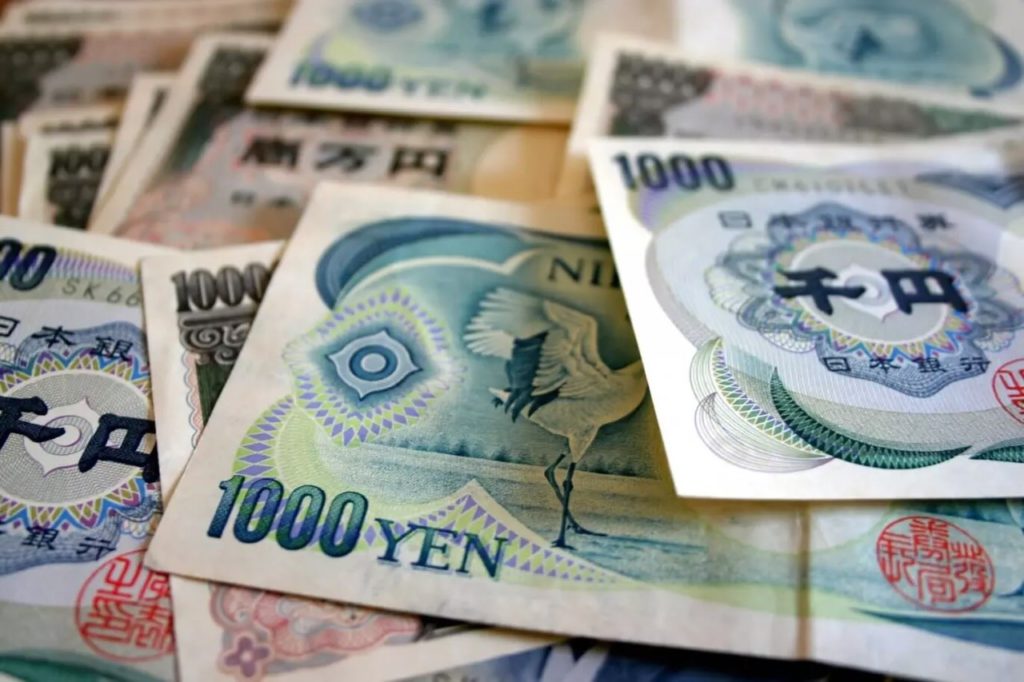
The Japanese yen (Japanese: 円, Japanese Roman pronunciation: en, English: Yen), whose banknotes are called Japanese Bank Notes, is the legal currency of Japan. The Japanese yen is often used as a reserve currency after the US dollar and the euro. The Japanese yen was created on May 1, 1871. There are four banknotes in circulation: 1,000, 2,000, 5,000, and 10,000 yen, and coins in six denominations: 1, 5, 10, 50, 100, and 500 yen.
What is special is that the issuer of Japanese yen banknotes is the Bank of Japan ("Bank of Japan - Bank of Japan Notes"), and the issuer of Japanese yen coins is the Government of Japan ("Japan"). In addition, Japanese yen coins do not have unlimited legal solvency, so in principle, the legal limit for the use of coins of the same face value in a transaction is 20 coins (that is, the maximum payment capacity of coins in principle is 1 yen × 20 pieces + 5 yen × 20 pieces + 10 yen × 20 pieces + 50 yen × 20 pieces + 100 yen × 20 pieces + 500 yen × 20 pieces = 13,320 yen). The merchant has the right to refuse the excess amount in accordance with the law.
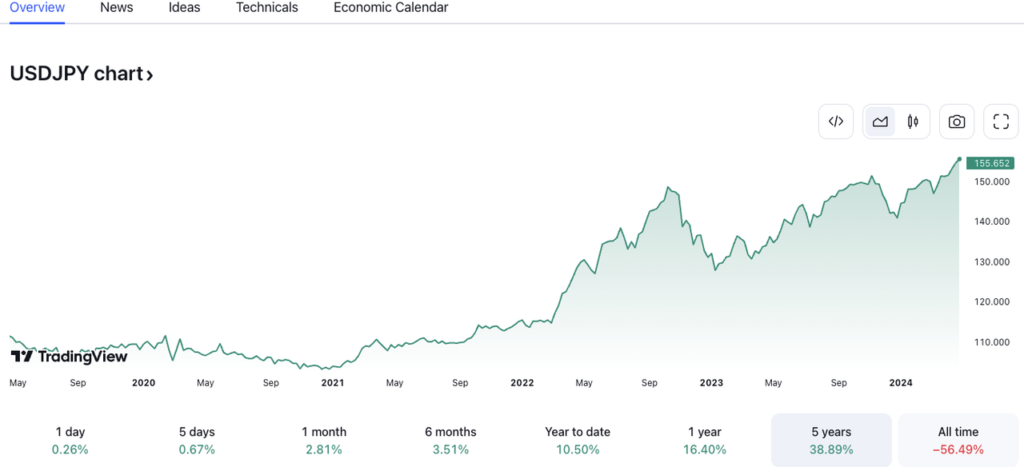
While the U.S. Federal Reserve and other central banks are aggressively raising interest rates in 2022 and 2023 to curb inflation, the Bank of Japan has kept interest rates at zero and continues to print large amounts of fiat currency. In 2023, Japan's core inflation rate rose by 3.1%, the largest increase since 1982.
Inflation erodes the purchasing power of fiat currencies and prompts investors to put money into alternative assets with store-of-value appeal like Bitcoin and gold. Unless the Bank of Japan accelerates its planned exit from ultra-easy monetary policy, the dollar will continue to appreciate against the yen, making it more attractive relative to other assets.
Crypto market status and characteristics
Japan has been actively cultivating the web3 industry. The government released a web3 white paper, reformed taxes, and attracted investment. The Japanese government also announced a five-year start-up development policy, planning to increase the number of Japanese start-ups to 100,000 within five years. And invested approximately 10 trillion yen to establish 100 unicorn companies.
The government strongly supports blockchain development
The Web3 project team of Japan's ruling party released a white paper on April 6, 2023, regarding Web3 as a national strategy. To this end, the Japanese government has invested a lot of resources in promoting the research and application of blockchain technology. For example, the Japanese Cabinet Office has established a number of special funds to support research on innovation and practical applications of blockchain technology. In addition, the Japanese government is actively promoting international cooperation and communicating and cooperating with other countries in the standard setting and regulatory framework construction of blockchain technology.
Japan's application in the field of blockchain covers many aspects, such as real estate registration, identity authentication, inter-bank clearing, Bitcoin insurance, supply chain finance, etc. The following are some specific cases:
Real estate registration: The Japanese government plans to integrate the country’s real estate data, approximately 230 million land parcels and 50 million buildings, into a single blockchain ledger to improve the visualization, accuracy and security of the data. The project is still in the testing phase and is expected to be completed within the next five years.
Identity authentication: Japan’s Financial Services Agency (FSA) has developed a blockchain platform that enables customers to share personal information among multiple banks and financial institutions and use shared IDs for account opening. In addition, SoftBank Group has cooperated with TBCASoft to launch a blockchain-based identity recognition and verification project, using zero-knowledge proof and distributed ledger technology to protect personal identity information from theft.
Interbank clearing: Fujitsu has partnered with Mizuho Financial Group, Sumitomo Mitsui Financial Group and Mitsubishi UFJ Financial Group to develop a peer-to-peer remittance service using blockchain to improve the efficiency and security of remittances.
Bitcoin insurance: As Bitcoin exchanges frequently suffer hacker attacks, resulting in losses of customer assets, Japan's Mitsui Sumitomo Insurance Company and bitflyer launched a Bitcoin insurance product to provide compensation services for Bitcoin assets and cover internal company accidents and losses caused by improper operations by employees.
Supply chain finance: Mizuho Bank and Japan's IBM jointly developed a blockchain trade finance platform, which enables fast and secure exchange of digital transaction documents and supply chain transaction data, and improves the transparency and creditworthiness of all parties to the transaction.
Web2 giant enters encryption industry
Investments in the Japanese encryption industry are often led by existing Web2 giants such as securities companies, telecommunications companies, and distributors, rather than venture capitalists (VCs). There are also very few local venture capital institutions specializing in web3 investments. Among them, Japanese Web2 giant SBI Group participates in the encryption industry through joint ventures and subsidiaries:
- SBI Digital Asset Holdings: Security Token Services
- SBI VC Trade: Cryptocurrency trading service
- SBINFT: NFT business
Others specializing in the crypto industry through the establishment and development of subsidiaries and joint ventures include:
NTT DoCoMo (Japan’s largest telecommunications company): NTT Digital
Sony (leader in electronics and entertainment industries): Sony Network Communications Inc. SoftBank and Line: Z Venture Capital
GameFi and NFT have high popularity and potential
Due to policy restrictions, Japan cannot directly invest in tokens and issue tokens, which limits the development of DeFi in Japan. As a result, in Japan, NFTs and blockchain games are widely considered to be major players in its cryptocurrency market.
Japan has a globally influential gaming industry and is one of the countries with the highest per capita profits in the global gaming market. Its gaming industry has a long and rich history, providing a solid foundation for the development of crypto games. Japanese players are also known for their willingness to pay for high-quality games, and their love for games gives the Japanese blockchain game market huge profit potential.
Japan not only has a rich and long history of video games, but also has the largest amount of IP (intellectual property rights) in the world, including animation, comics, and video games. These cultures have transcended national borders and become globally famous. Because of this, the Japanese NFT community also has unique aesthetics and preferences that are different from other parts of the world. Moreover, Japan's hot spots are sometimes not synchronized with the world, and there will be a certain degree of mismatch delay. Previously, after the NFT boom in China and the United States passed, Japan's various NFTs exploded.
The market is easy to defend but difficult to attack and localization sentiment is obvious
The Japanese market is a relatively independent and closed market. Due to language barriers (Japanese people have psychological barriers to English) and the cautious tendency of Japanese KOLs, it is difficult to market encryption projects in Japan. Overall, it is easy to defend but difficult to attack. Type market. The localization sentiment of Japanese encryption users is very obvious. However, due to the malicious harvesting behavior of some local projects, people's emotions towards local projects have begun to become complicated. Although they still tend to support domestic projects, they clearly show a lack of confidence.
Compared with local projects, local users are less enthusiastic about foreign projects. Overseas projects need to adapt their products and services to local regulations, translate information into Japanese, and cooperate with local KOLs and media to hold local events. By reaching localized audiences, projects gain greater visibility and users.
It is worth noting that in the mindset of Japanese users, they have the awareness to actively consider the project side and the merchants. For example, when the merchants set prices very low, they will think about whether the merchants can recover their costs and consider for the merchants. If the encryption project is actively When doing things, Japanese users will show a more tolerant and understanding attitude than users in other markets, which will help create a positive social atmosphere.
Encrypted user characteristics
TripleA estimates that more than 5 million people, accounting for 4.0% of Japan's total population, currently own cryptocurrency. This value is verified by data from licensed exchanges. In addition, a report by KuCoin in May 2023 showed that approximately 3.8 million cryptocurrency investors in Japan owned or invested in crypto assets in the previous 6 months, accounting for approximately 5% of Japan’s adult population; in Japan, although BTC and ETH remain the most popular crypto assets among Japanese investors, but there is great interest in diversifying into multiple areas, such as NFTs, Metaverse, stablecoins, public chains, DeFi and meme coins.
The proportion of male investors far exceeds that of female investors
Japanese Cryptocurrency Investor Profile and Investment Experience
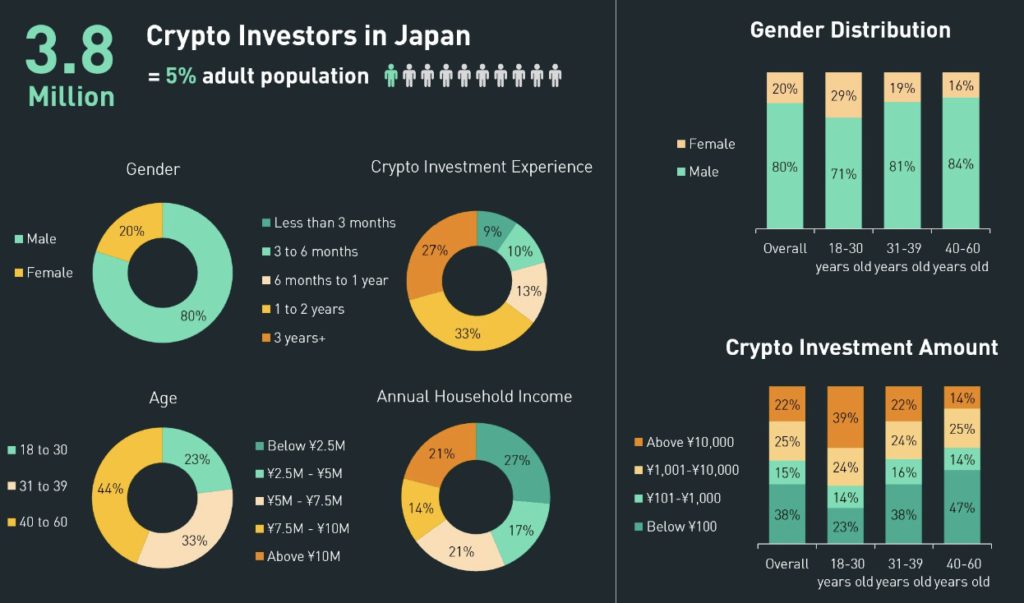
Men are more interested in cryptocurrency investment based on their knowledge of various regional markets. However, this phenomenon is most obvious in the Japanese market, where 80% of investors are male and only 20% are female investors.
Unlike several other markets, most cryptocurrency investors in Japan are over 30 years old, accounting for 77%. On the other hand, the younger generation between 18 and 30 years old only accounts for 23% of Japanese cryptocurrency investors.
Additionally, the maturity of cryptocurrency adoption in Japan is relatively high. Among the investors surveyed, 27% have invested in cryptocurrencies for more than 3 years, 33% have been users for 1-2 years, and only 9% of the respondents have just come into contact with crypto assets.
Cryptocurrency investing is also more common among households with lower incomes, with 44% of investors having annual household incomes of up to 5 million yen. However, only 21% of cryptocurrency investors in Japan have an annual income of more than 10 million yen.
Young people are more confident in the innovative capabilities of cryptocurrencies
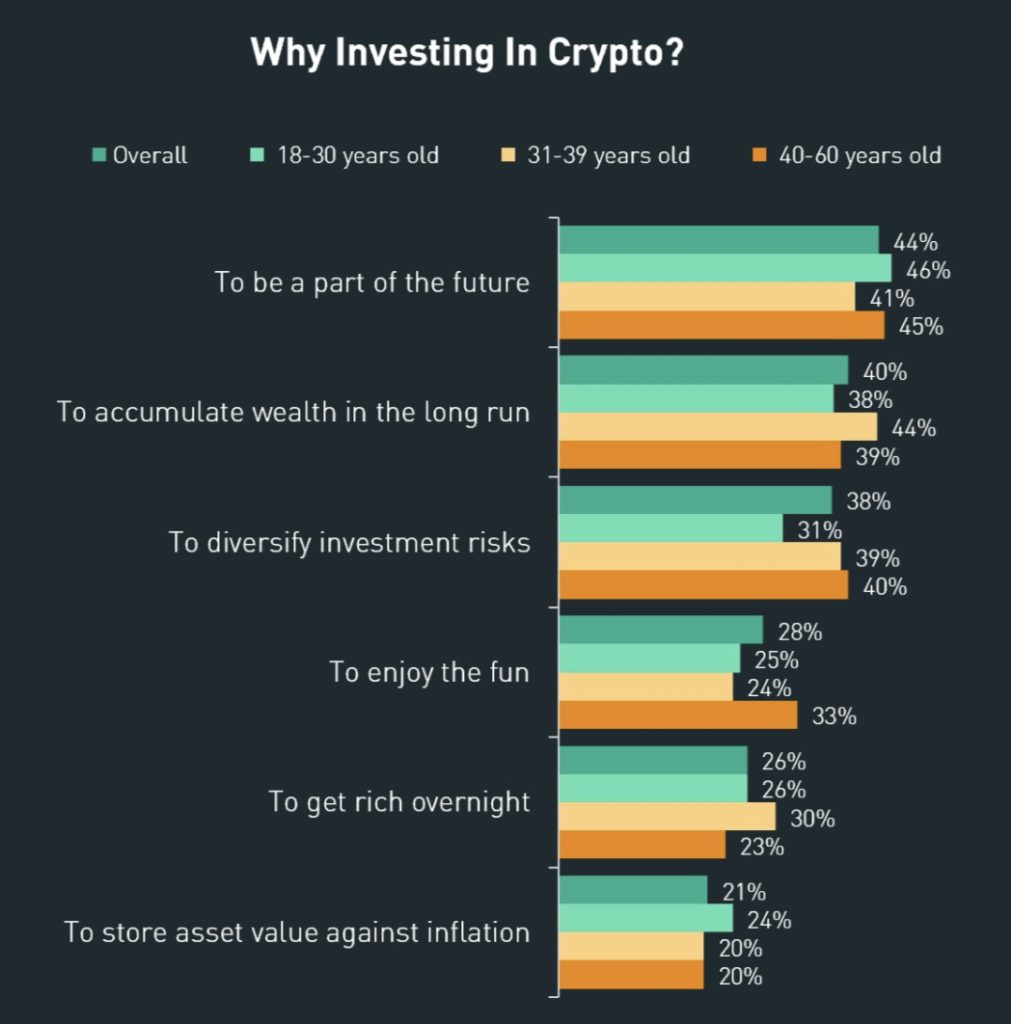
Other top reasons for Japanese investors turning to cryptocurrencies include long-term wealth accumulation (40%) and investment risk and portfolio diversification (38%). While 28% of investors are involved in cryptocurrencies because they think it's fun, 26% believe it can make them rich overnight. Only 21% of Japanese cryptocurrency investors believe that crypto assets are a store of value against inflation.
Among them, 44% of investors believe that investing in cryptocurrencies can secure the future, and the largest group in this category are investors aged 18 to 30 who invest in cryptocurrencies because they believe in its cutting-edge technology and financial innovation potential.
The overall trading frequency is low, especially for investors over 40 years old
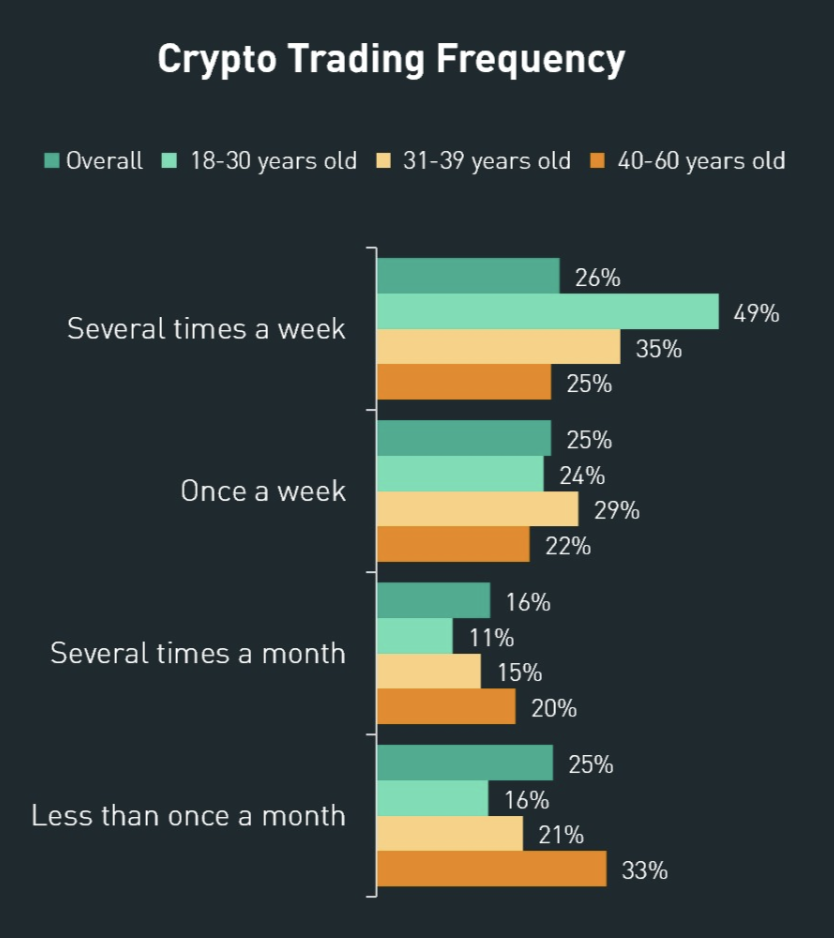
There is a strong correlation between trading frequency and age. Among them, young investors aged 18–30 are the most active and trade every week; users aged 40–60 trade on average once a month; and users aged 31–30 are the most active. The 39-year-old user has no obvious characteristics, and is distributed once a week, multiple times a week, and multiple times a month.
Investors over 40 years old prefer BTC and ETH
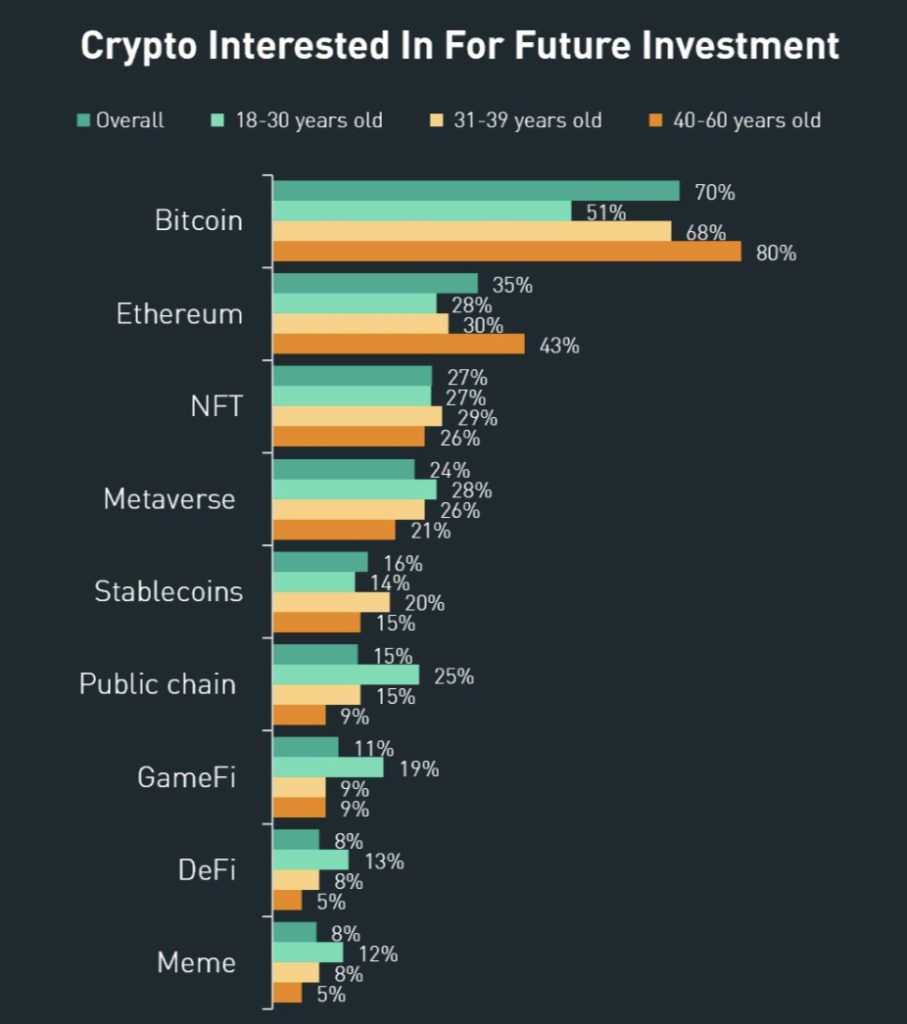
As in other regional markets, BTC and ETH account for the highest proportion of Japanese users’ investment portfolios, across all age groups. In particular, investors between the ages of 40 and 60 are most interested in these cryptocurrencies, with 80% of investors expressing interest in Bitcoin and 43% in Ethereum.
Other popular categories favored by Japanese investors are: NFT (27%), Metaverse (24%), stablecoins (16%) and public chain projects (15%);
In addition, GameFi (11%), DeFi (8%) and Meme coins (8%) have gradually become crypto investment choices for Japanese users;
Social media is the main channel for people to learn about cryptocurrencies
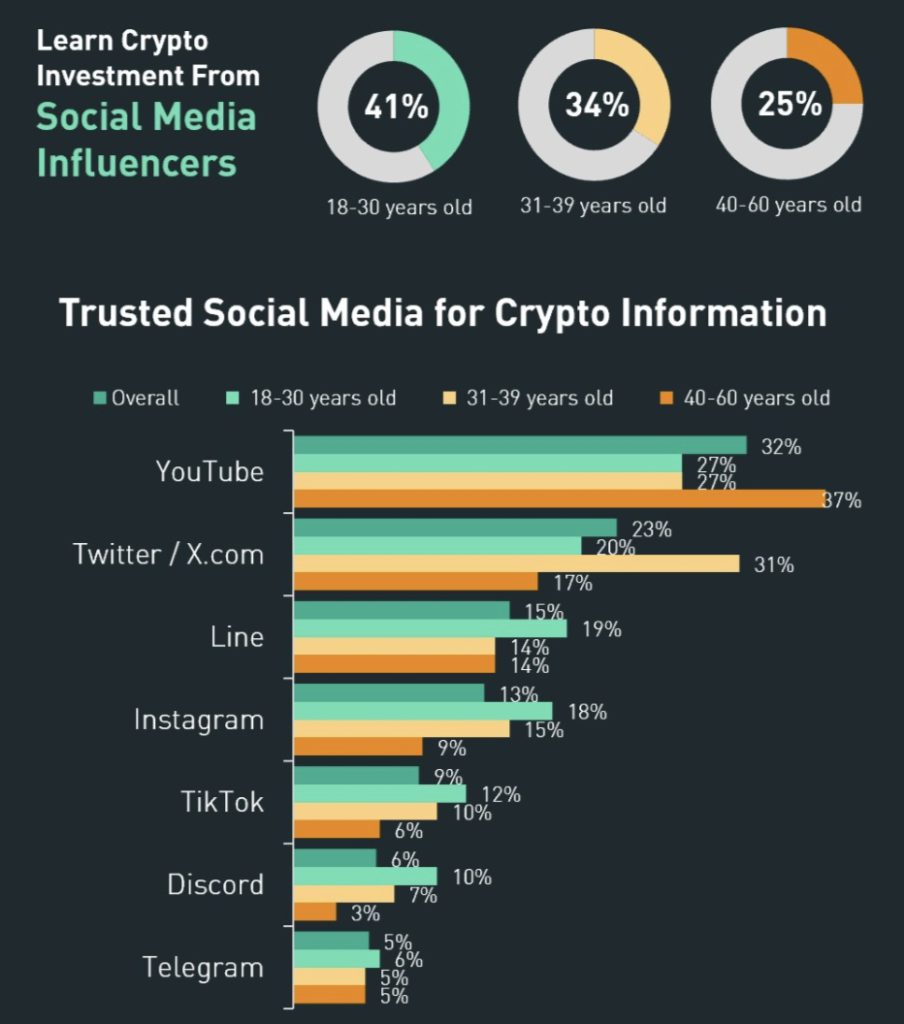
Most Japanese investors learn about cryptocurrencies through social media and KOLs, and this trend is highest among younger groups, with 41% of investors aged 18–30 relying on influencers to learn about cryptocurrency investments.
Social media that people trust and use include: YouTube (32%), Twitter (23%), Line (15%), Instagram (13%) and TikTok (9%). It can be seen from the data that more technical social channels such as Discord, Telegram and Reddit are not trusted by Japanese users. They believe that these channels are more risky.
Current status of CEX in Japan
Cryptocurrency exchanges require a license from the Japan Financial Services Agency (JFSA), as required by local regulators. Most licensed cryptocurrency exchanges are registered in Tokyo or Osaka.
Binance Japan is famous for its diverse Token types
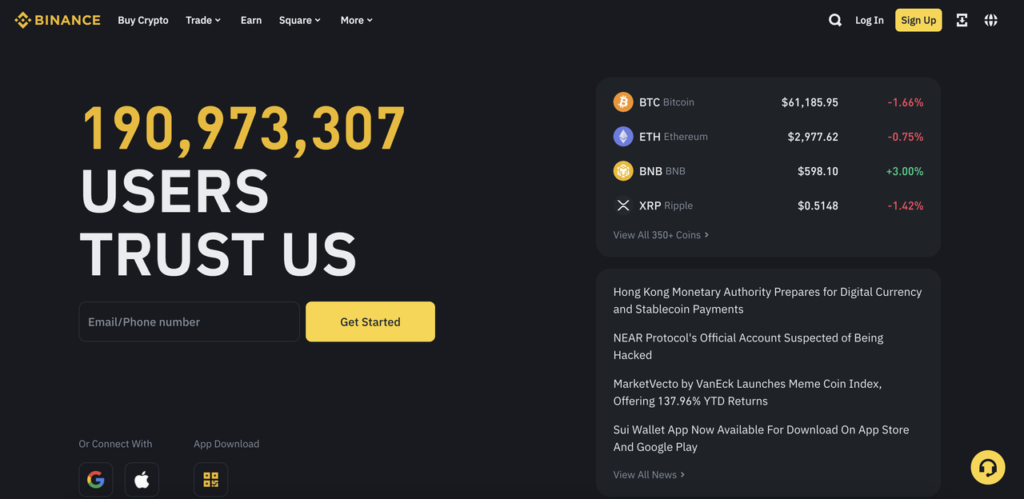
Launched in August 2023, Binance Japan was renamed after Binance acquired the local licensed CEX Sakura Exchange BitCoin in November 2022. The move marks Binance’s return to the Japanese market, after the country’s financial regulator warned it again in 2021 of operating without a license. Currently, Binance Japan is famous for its rich and diverse Token types and is loved by many users.
Bybit fully meets Japanese investor preferences

Bybit has a secure platform that hosts over 1,000 cryptocurrencies and adheres to Japan’s strict regulations, facilitating a seamless entry into cryptocurrency trading. It offers direct local Japanese yen deposit options, including bank transfer, JCB Card and Line Pay, simplifying investment access.
Bybit’s competitive advantages include low transaction fees (starting at 0.01% for market makers and 0.06% for takers), abundant liquidity, more than $30 billion in daily trading volume, and a vibrant community with more than 20 million users. group, which confirms its market leading position.
Coincheck has a friendly interface and no transaction fees
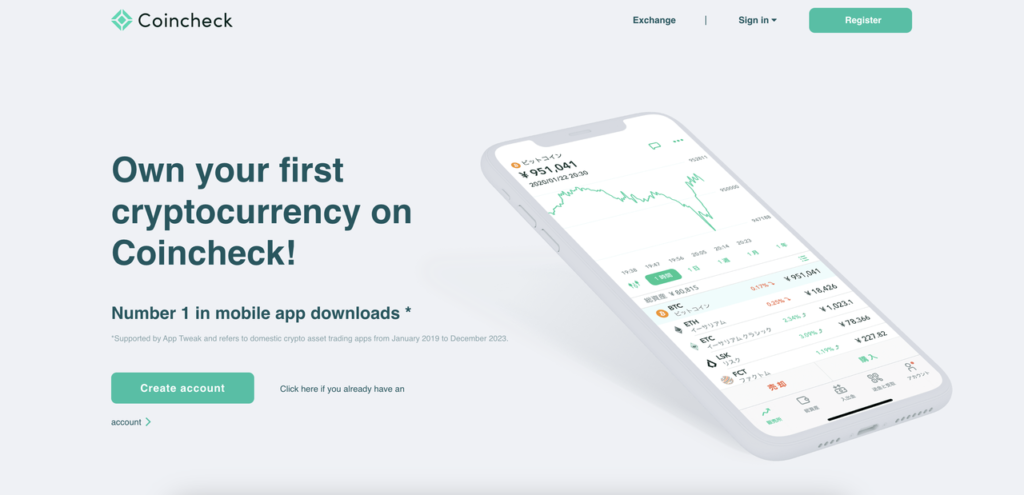
Founded in 2014, Coincheck is Japan's largest cryptocurrency exchange with more than 2.5 million users. In 2018, it was acquired by Monex Group, a Japanese financial services company founded in 1999 that operates diversified businesses including online brokerage, asset management and cryptocurrency services.
Coincheck provides diversified cryptocurrency trading services and attracts a large number of local Japanese and international users. With its user-friendly interface and no transaction fees, Coincheck has become one of the most popular trading platforms in Japan.
Bitflyer’s advanced trading tools are a hit

Bitflyer is known for its advanced trading tools and features and ranks first in the country in terms of Bitcoin trading volume. It cleverly caters to the needs of different user groups, from novices to experienced traders, by offering two tailor-made trading experiences: the intuitive bitFlyer Exchange for beginners, and the advanced BitFlyer Lightning for the more sophisticated trading strategy.
BitFlyer has broadened its appeal with innovative features, including a unique crypto credit card, the opportunity to earn BTC, and a Bitcoin T-Point exchange. These moves solidify bitFlyer’s reputation as Japan’s third-ranked cryptocurrency trading platform, while taking into account accessibility and depth for a wide range of investors.
Bitbank App Store Top Rated
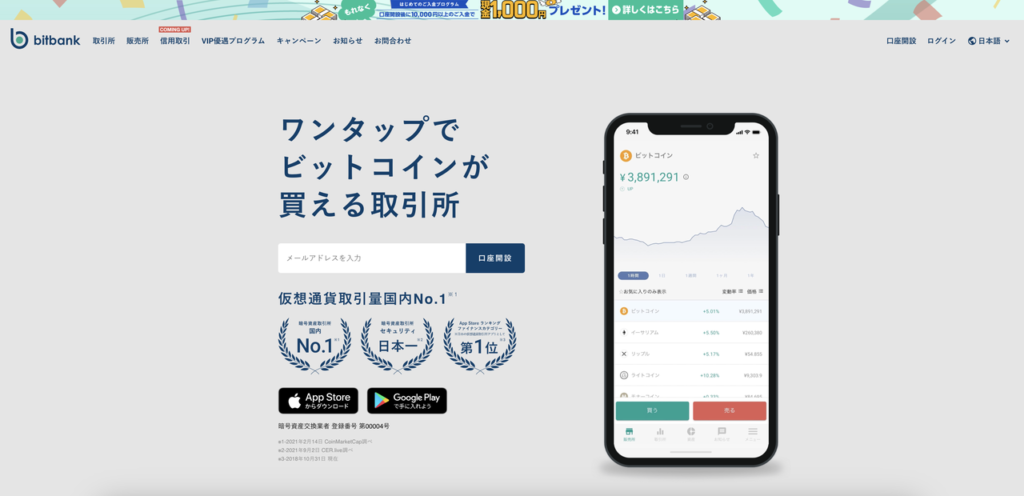
Bitbank is the highest-rated cryptocurrency trading app in Japan’s Apple App Store and one of the few digital asset exchanges in Japan to offer instant account verification, typically within minutes.
In addition to trading functions, Bitbank also provides lending services, allowing users to lease assets to Bitbank with a return rate of up to 3%. Third-party institutions have spoken highly of Bitbank's security performance. The platform uses offline cold wallet and Multisig technology to ensure resistance to hacker attacks and protect users' asset security with advanced technology.
Zaif is known for privacy and security
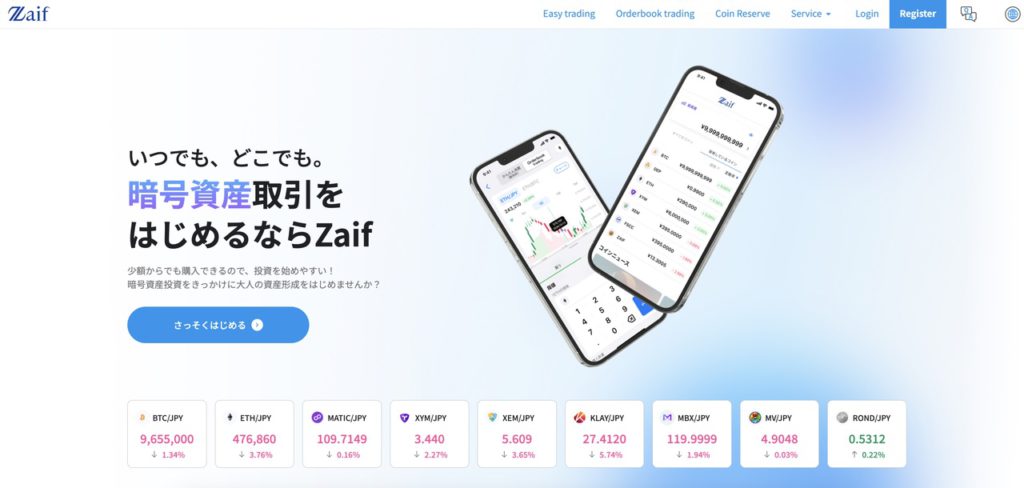
Zaif has over 500,000 users. Founded in 2014, the platform offers a variety of cryptocurrencies including Bitcoin, Ethereum, and other cryptocurrencies. Known for its focus on privacy and security, Zaif attracts traders who prioritize these features.
It allows users to buy and sell various cryptocurrencies in Japanese yen and also allows margin trading, making it suitable for beginners and those who want to trade quickly. Since its inception, Zaif has been in the process of continuous development, and it has added new features such as transactions, payment services, and currency reserves.
Japan's Web3 Project
The Japanese encryption market has a low level of project type richness. Although there are also public chain and DeFi projects, they are mainly based on non-fungible tokens (NFT) and game projects. These projects are largely focused on local and long-term community building.
Japan Open Chain
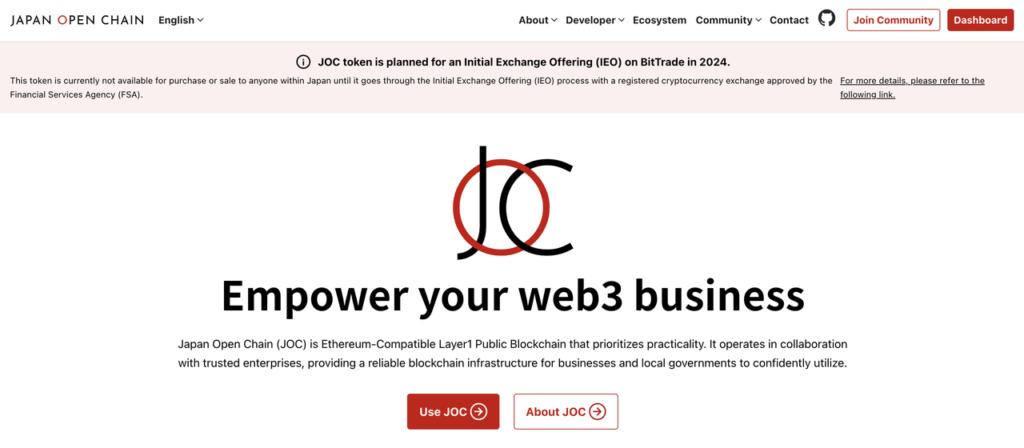
Japan Open Chain (JOC) is an Ethereum-compatible Layer 1 public chain with a focus on practicality. It cooperates with trustworthy enterprises to provide reliable blockchain infrastructure for enterprises and local governments. Japan Open Chain is a blockchain infrastructure operated by Japanese companies that complies with Japanese law and provides a secure environment for developing web3 businesses.
INTMAX

INTMAX is a new type of zkRollup, as an Ethereum L2 network, suitable for various web services and finance. It will enable Ethereum to enable all online citizens to participate in the economy through payment infrastructure and internet-native ownership of NFTs and community-governed tokens. NTMAX has made significant innovations in ZK implementation, making it a unique Layer 2 rolling network with low cost, security, adjustable privacy and, most importantly, scalability.
HashPalette
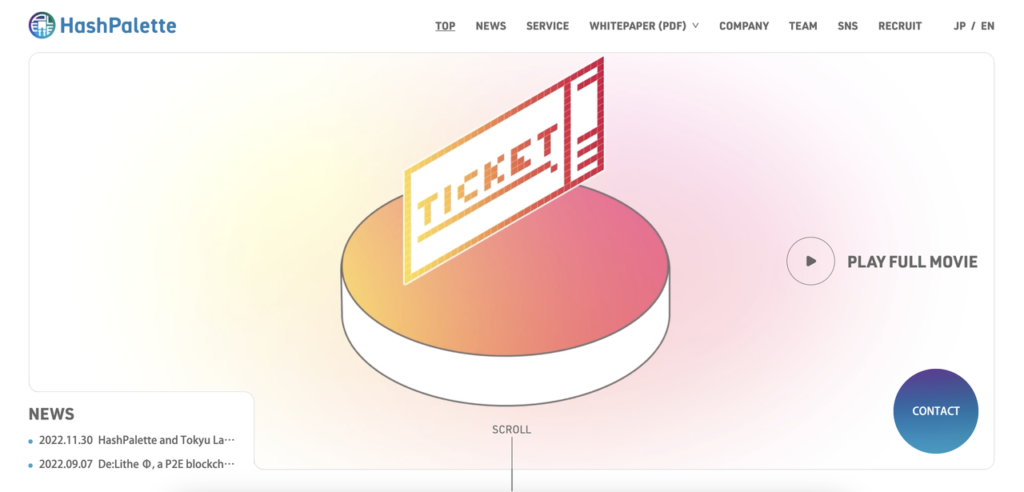
Palette is a blockchain network for issuing, managing and distributing digital items. Users can freely transfer ownership of digital items and use them within the application. Palette allows digital projects to be processed as NFTs on its own blockchain, the Palette Chain. Palette Chain is a blockchain specifically designed for the issuance, management and distribution of digital items in the entertainment sector and is designed to adapt to business models. In addition, Palette Chain can be connected to multiple blockchains including Ethereum, and can serve as a cross-chain platform and a center for NFT issuance and distribution.
Hashport

HashPort is a cross-chain interoperability layer that supports the fast and secure cross-network transmission of digital assets. It is developed and provided by HashPort Co., Ltd. of the same name. HashPort Co., Ltd. was established in 2018 with the vision of asset digitization and for Provide blockchain technology consulting and solution services to customers
KEKKAI

KEKKAI is a Web3.0 security plug-in that detects dangers by analyzing transaction simulations and aims to eliminate fraud in the growing Web3 field. If users use KEKKAI, they can obtain the risk judgment information provided by it during transactions - if there is an abnormality, KEKKAI will display a risk prompt on the page.
Murakami Flowers

Takashi Murakami is a renowned Japanese artist known for his colorful works and unique artistic style. The Murakami.Flowers project (MF for short) initiated by him is a comprehensive project covering art, design and digital creation. The project is centered on the number "108" (composed of 108 backgrounds and 108 small flowers), which echoes the numbers related to troubles and worldly temptations in Buddhism, meaning that the artist is trying to transcend worldly constraints through digital art.
Crypto Ninja Partners

Crypto Ninja Partners (CNP) is a Japanese ninja-themed NFT series that originally originated from a community called NinjaDAO. Although NinjaDAO is not a DAO organization in the strict sense, this community has gathered many cryptocurrency enthusiasts from Japan. Two core figures, Ikehaya (Japanese NFT KOL and Web Marketer) and Road (another core contributor), jointly promote the development of CNP.
MetaSamurai

The vision of this project is to build a digital fashion brand and empower creators. The core concept of the project is "I GOT YOUR BACK", which symbolizes MetaSamurai's commitment to supporting its NFT holders. "I GOT YOUR BACK" This sentence originated from a story, telling the scene of two people protecting each other back to back in battle; the spirit of the samurai is to resolutely devote oneself to protecting the lord; the loyal dog Hachiko has been waiting for more than ten years. deceased owner. These are the sources of inspiration for MetaSamurai's works.
Japanese Crypto Venture Capital
Skyland Ventures

Skyland Ventures (SV) is a venture capital (VC) fund headquartered in Shibuya, Tokyo, focusing on seed-stage entrepreneurial investments. As of 2022, it has invested in more than 120 startups, mainly in Japan. Starting in 2022, the fund will target equity/token investments in startups in the Web3 space (cryptocurrencies, NFTs and blockchain). The fund invests from approximately $50,000 to $500,000 at the pre-seed stage to investments at the seed stage and beyond, ranging from $100,000 to $1,000,000. Its founders are Max Kinoshita, Yonkuro Masanori Ikeda and Yuan Xiaohang.
They work with Hash Global, OKX Ventures, Foresight Ventures, MH Ventures, and Generative Ventures, among others.
Investment history:
Raised $4 million in venture funding for seed startups in 2012.
Invested in 16 companies.
Trasnlimit (providing BrainWars brain battle game, installed 13 million times globally, supported by LINE and Braindots, with a total download volume of 23 million times)
Hachimenroppi (a fresh food market powered by Recruit and Yahoo! Japan)
Kaumo.jp/CuRAZAY.com (targets popular website in Japan, received 4-5 million unique users)
Gumi Cryptos

This venture capital firm is a boutique early-stage venture capital firm based in Silicon Valley, with investments covering information technology, financial services, games, insurance, infrastructure, cryptocurrency, cybersecurity, blockchain and financial technology in the United States. , Canada, Europe, Israel, East Asia, South Asia and Southeast Asia, including Japan. Its co-founder is Zirui Zhang, and its managing partners are from Japan and China.
Some of the major investments include OpenSea, 1inch and Lit.
CGV Fund

CGV is an Asia-based fund management company focused on investments in crypto funds and crypto studios. CGV FoF is comprised of family funds from Japan, South Korea, China and Taiwan, with its headquarters in Japan and branches in Singapore and Canada. The founders are Steve Chiu and Kevin Ren.
They work with Waterdrip Capital, LK Venture, ZC Capital, Satoshi Lab, and Blockchain Founders Fund, among others.
Some of the projects in their portfolio include AlchemyPay, Bitkeep, Metis, TheGraph, Avalon and Celestia, as well as recent Bitcoin ecosystem projects - Bitcoin wallet infrastructure UniSat, bitSmiley and BTC second layer network ZULU.
BDASH Ventures
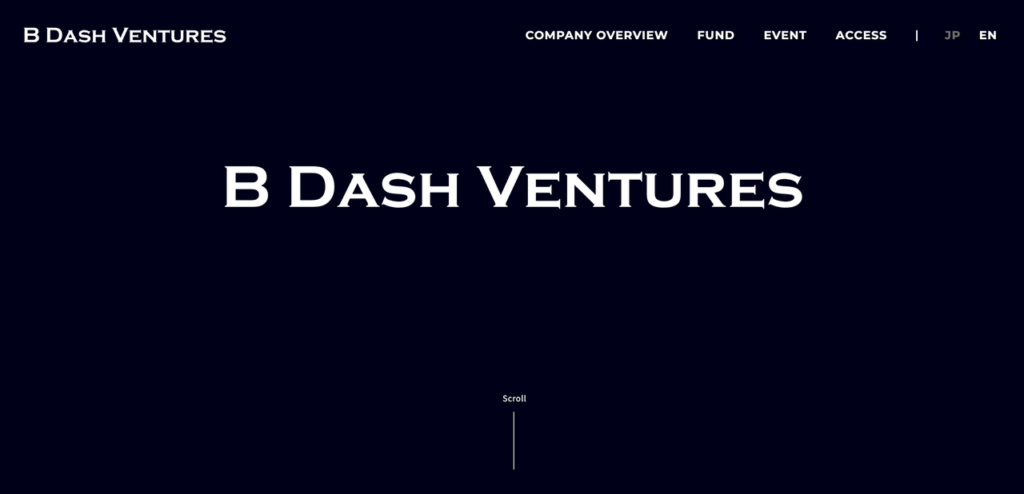
BDASH Ventures is a venture capital firm based in Tokyo, Japan that invests in seed, early and late-stage startups that will be at the heart of next-generation technologies. The company's CEO is Yuki Watanabe.
B Dash Ventures hosts a biannual semi-annual summit for high-level technology industry executives and startup founders called B Dash Camp. It is now one of Japan's largest invitation-only technology events, attracting more than 700 guests from inside and outside Japan.
GMO AI&Web3

The crypto venture capital fund is part of GMO Internet Group Inc., which is listed on the Tokyo Stock Exchange. Part of the group also includes GMO Coin, a Japanese licensed cryptocurrency exchange that lists 28 cryptocurrencies.
MZ Web3 Fund
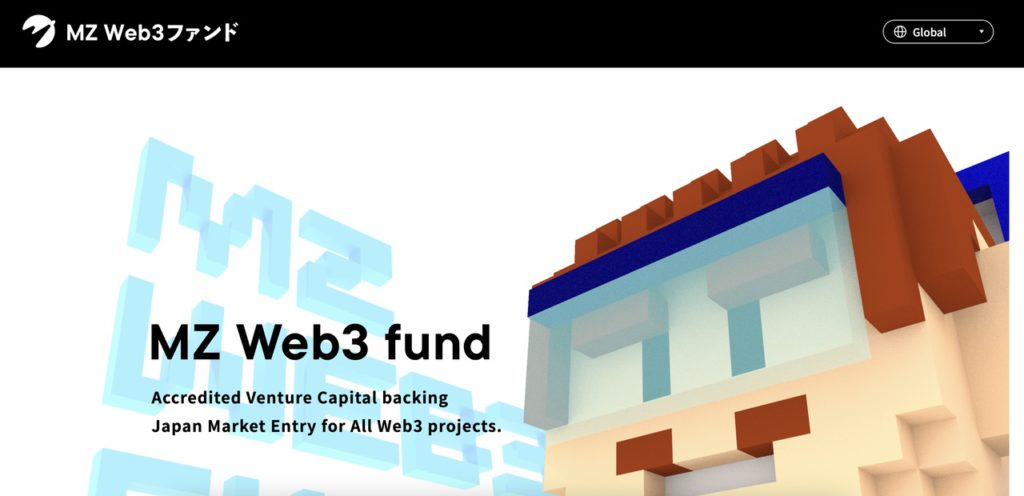
MZ Web3 Fund was established by Yusaku Maezawa, known as Japan's Musk. It focuses on Web3 project investments and is the most active crypto fund in Japan. MZ Web3 Fund has invested in 24 start-up projects in the Web3 field, including decentralized storage project SINSO, payment tools Slash and Transak, development community WEB3DEV, game public chain Oasys, and Web3 user growth platform Aki Network. MZ Web3 Fund will provide community resources of MZ Club and MZ DAO to invested projects to help them rapidly expand in the Japanese market.
Crypto market regulation in Japan
In the global encryption market, Japan is a unique market, especially in the financial and investment fields, with huge potential. However, because the encryption market was often attacked by hackers in the early days, the Japanese government has a conservative attitude towards the encryption industry and carefully regulates it. . On the other hand, Japan's strong sense of crisis has led the authorities to try to use emerging technologies such as blockchain to maintain its status as the world's third largest economy. On the contrary, Japan's blockchain industry regulatory policies have shown mature and stable characteristics, making The atmosphere for blockchain entrepreneurship is great.
The legal status of cryptocurrencies
In 2016, the Japanese Cabinet passed an amendment to the Fund Settlement Algorithm, which came into effect in April 2017, providing a legal definition of cryptocurrency and recognizing the legality of cryptocurrency. Under the "Fund Settlement Algorithm", digital currency is considered a digital currency if all of the following conditions are met:
Property value recorded electronically on an electronic device or other item;
Organizations can be transferred using electronic information processing;
It is not a currency-denominated asset such as domestic currency or foreign currency;
Can be used by unspecified persons when purchasing, renting items or receiving services;
Can buy and sell to unspecified persons;
In other words, Japan recognizes cryptocurrencies as a legal means of payment. The "Fund Settlement Algorithm" is the world's first bill to incorporate digital currency into the legal regulatory system, which is of great significance to the digital currency market.
Cryptocurrency tax policy
In January 2022, Japan's ruling Liberal Democratic Party established a digital society promotion headquarters, and at the same time the Japanese government launched a "national strategy." Since then, its Web3 task force has been recommending legislative and regulatory reforms directly to the ruling party. Many of these reforms have been adopted, but others remain pending.
In terms of corporate taxation, in order to promote a "token financing-friendly environment" for companies, the Japanese Web3 policy team proposed two reforms. First, "tokens that are continuously held by the issuing company" are exempt from "corporate income tax based on year-end market value"; secondly, "tokens issued by other companies and held by third parties that are not intended for short-term trading" are exempt from tax. The first reform comes into effect in June 2023, and the second reform has just been proposed by the FSA and included in the 2024 legislative agenda and adopted by the Ministry of Economy, Trade and Industry (METI). Taking both measures could alleviate the long-standing disadvantage faced by domestic corporate investors in Japan compared with overseas investors who can rely on more favorable tax treatment.
In terms of personal taxation, income from crypto asset transactions is taxed as "miscellaneous income", and when "income tax and resident tax" are combined, its "minimum tax rate is 55%." And this tax is levied not only when crypto-assets held are converted into fiat currency, but also when they are converted into other crypto-assets, causing an exodus of taxpayers and hindering taxpayers from filing taxes.
The Web3 policy team proposed four reforms. First, a uniform 20% tax is levied on crypto-asset transactions; second, “gains and losses” are taxed only when converted into legal tender, thereby exempting “the exchange of crypto-assets” from tax; third, individuals are allowed to settle losses Transfer for up to three years; fourth, the same tax rate applies to “crypto asset derivatives transactions”. But these reforms were left out of the 2023 agenda, and it is unclear whether the proposals will become part of the 2024 legislative agenda.
Exchange licensing system and self-regulatory organizations
According to the amendments to the Fund Settlement Algorithm, institutions engaged in cryptocurrency trading need to apply for a license from the Japan Financial Services Agency and accept its supervision. If you engage in digital currency exchange in Japan, generally speaking, you need to meet the following four basic conditions:
Subject: Co., Ltd. or a foreign digital currency trading institution (with a business location in Japan and a representative in Japan);
Registered capital: Have a property foundation, registered capital of more than 10 million yen, and positive net assets;
Company system: A company system that can properly and reliably execute business (such as isolating user assets from company assets, establishing an effective risk management system, and preventing risks such as hacker attacks, system failures, money laundering, and terrorist financing);
Compliance: Comply with relevant laws and regulations, protect user privacy, fulfill anti-money laundering obligations, and cooperate with inspections and investigations by the Financial Services Agency;
All tokens listed on Japanese compliance exchanges need to be approved by the Japan Virtual Currency Exchange Association (JVCEA). This cycle is at least 6 months to one year, which also makes the Japanese encryption market less dynamic.
In addition to the supervision of the Financial Services Agency, in order to improve the credibility and transparency of the industry, protect the interests of investors, and promote the healthy development of the cryptocurrency market, in April 2018, with the approval and authorization of the Financial Services Agency, Japan established 16 licensed exchanges The institute initiated the establishment of the Japan Virtual Currency Exchange Industry Association (JVCEA) for self-regulation. The association has developed a series of self-regulatory rules and guidelines, including:
Classify and manage the cryptocurrencies provided by the exchange, and determine their listing conditions based on their security, liquidity, transparency and other factors;
Conduct risk assessments on exchanges, set leverage upper limits, margin ratios, forced liquidation mechanisms, etc.;
Provide information disclosure to exchanges and require them to disclose trading rules, fee standards, customer complaint handling methods, etc.;
Provide consumer education to exchanges to improve their understanding and risk awareness of digital currencies;
7.4 Cryptocurrency issuance and financing rules
In September 2019, the JVCEA promulgated the "Related Rules for New Coin Offerings" and supporting guidelines, allowing the public issuance and sale of tokens for financing (IEO and ICO). This is the first time Japan has established a clear regulatory framework for the financing of cryptocurrency issuances. According to the rules and guidelines, if you want to issue and sell tokens compliantly in Japan, you mainly need to meet the following conditions:
The issuer or underwriter must be a licensed exchange and report relevant matters to the Financial Services Agency and the Association;
The issuance of tokens must comply with the security, liquidity, transparency and other standards set by the association, and pass the review of the association;
The issuance of tokens must have a reasonable pricing mechanism and fully disclose relevant information to consumers;
All issued tokens must be sold within a certain period, and the sales status must be reported to the association;
At present, under the "Related Rules for New Coin Offerings", the frequency of ICO/IEO in Japan is not high. On September 26, 2023, in order to better improve the situation of IEO, JVCEA further released an initial proposal for the direction of IEO reform .
To sum up, Japan is a country with an open and positive attitude towards blockchain technology and digital currency. It has formulated relatively complete and clear regulations in terms of laws, taxes, licenses, self-discipline, etc., and is still constantly exploring and Innovate to adapt to the rapid changes and diverse application scenarios of blockchain technology, and attempt to gain a foothold in the development of the global blockchain industry. For blockchain entrepreneurs, although Japan has a strong localization sentiment, Japan is still a good soil for the encryption industry to gain a foothold and develop.
Summarize
As early as 2017, Japan officially recognized BTC as legal currency, and in April 2023, the ruling party's Web3 project team released a white paper, indicating that the government's investment in the industry is increasing, making Japan's encryption market change. become increasingly prosperous. However, restrictions such as the prohibition of direct investment in tokens and the inability to launch token issuance projects within Japan have restricted the development of DeFi projects and businesses in Japan, and instead formed industry characteristics centered on NFTs and games.
In terms of compliance, in order to ensure the stability of the investment market and the safety of investors’ assets, Japan has strict laws and regulations in the encryption field. However, the high cost of compliance and high tax burden have hindered the entry and development of the project. In particular, the lengthy approval process for token listings often makes people think that the market lacks vitality and lose confidence in this field. It also limits the innovation of enterprises and the flexibility of the market, causing Japan's cryptocurrency industry to lag behind other countries.
As the crypto industry penetrates and develops globally, Japanese institutional investors have also shown strong interest in the crypto market and have a clearer understanding of the potential of this industry. The participation of institutional investors has brought more liquidity, stability and credibility to the Japanese encryption market, which is promoting the development of the Japanese encryption industry, thereby attracting the interest of more retail and institutional investors.
In the ongoing regional competition in the crypto market, Japan has unique advantages in the fields of regulatory compliance, GameFi and NFT, and its strong sustainable community is also an indispensable tool for industry development. However, overly stringent tax policies and investment Financing restrictions still pose a strong resistance to the rise and development of the crypto industry in the country. If the policy level can be moderately open under the premise of regulatory compliance, it will be more conducive to the rooting, innovation and development of the encryption market. In particular, the combination of Japan's unique cultural characteristics and strong financial system will have the opportunity to make it a global leader in the field of GameFi and NFT, leading the future of the global encryption industry.






